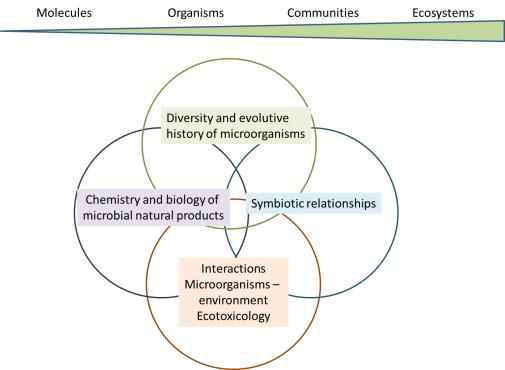The scientific objective of the MCAM unit is to understand the role of microorganisms in the maintenance and evolution of ecosystems.
We focus on several key questions, including:
- Is the diversity of microorganisms underestimated ?
- How, and by what mechanisms, do various biomolecules (secondary metabolites, peptides, proteins) intervene in the dynamic interactions between different microorganisms, as well as between microorganisms and their hosts, and microorganisms and their surrounding environment ?
-How do microorganisms contribute to the stability or to the evolution of the various ecosystems investigated ?
These studies involve a wide range of model microorganisms: bacteria, archaea, cyanobacteria, filamentous fungi, protists and nematodes. These model microorganisms are also studied with respect to diverse contexts: confined ecosystems and holobionts (intestinal microbiota, associations between bacteria and marine invertegrates, plant/fungal endophyte associations, parasite/host relationships), or open systems (bacteria, environmental cyanobacteria) in the face of biotic and abiotic factors. These various research projects are organized around 4 interconnected
themes that allow an integrated approach aligning the characterization of molecules produced by microorganisms to the impact of these molecules on the surrounding ecosystem.
Theme 1: Diversity and evolutionary history of microorganisms
Theme 2: Chemistry and biology of microbial metabolites
Theme 3: Symbiotic relationships
Theme 4: Interactions between microorganism and their environment, and ecotoxicology

©Cécile Bernard
This scientific objective is carried out by 4 research teams supported by analytical platforms (mass spectrometry, NMR, electron microscopy, imagery, and cytometry) as well as common services (microbiology, molecule isolation and purification, etc.).
Team 1: Biochemistry of Microbial Interactions (BIM, team leaders: Yanyan Li, CR CNRS)
Team 2: Chemistry of Natural Fungal Products (CPNF, team leader: Soizic Prado, PR MNHN)
Team 3: Parasites and Free-living Protists (PPL, team leader: Coralie Martin, PR MNHN)
Team 4: Cyanobacteria and Environment (CYANO, team leader: Benjamin Marie, Researcher MNHN)

